
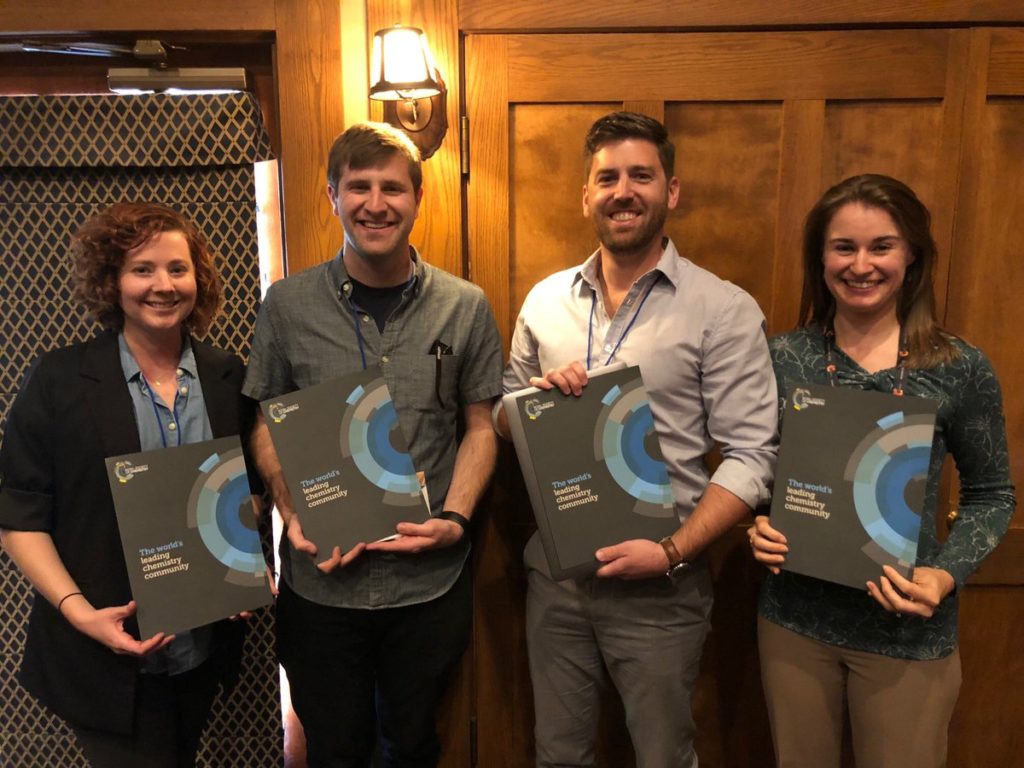
Research Presentation Prize winners from the Cohen group at UC San Diego. Left to right: Jessica Moreton, Chemical Science Oral Research Presentation Prize; Joey Palomba, Dalton Transactions Poster Prize; Kyle Bentz, Materials Horizons Poster Prize; Christine Morrison, Analyst Poster Prize.
Several RSC journals supported the 3rd annual University of California Chemical Symposium by sponsoring poster and presentation prizes. Chemical Science, our flagship journal, sponsored oral Research Presentation Prizes in each of the six subject areas and our core subject-area journals sponsored poster prizes.
An impressive showing came from the Cohen group from UC San Diego with three poster prizes and an oral presentation prize. Jessica Moreton was awarded a Chemical Science prize for her talk on MOFs in mixed-matrix membrane systems in the Materials/Nano category. In addition to Jessica’s talk, three posters from the Cohen group won poster prizes. Joey Palomba won the Dalton Transactions Poster Prize for Inorganic Chemistry for his work on high-throughput screening methods for MOFs for nerve agent degradation. Christine Morrison won the Biochemistry category ChemComm Poster Prize for her work on drug discovery methods using metallofragments. Kyle Bentz won the Materials category with a Materials Horizons Poster Prize for his work on hollow amphiphilic crosslinked nanocapsules; Kyle is also serving as Vice-chair of the 2019 UCCS. The group’s leader, Seth Cohen, helped found the UCCS and is surely pleased to see such a strong performance from his group.
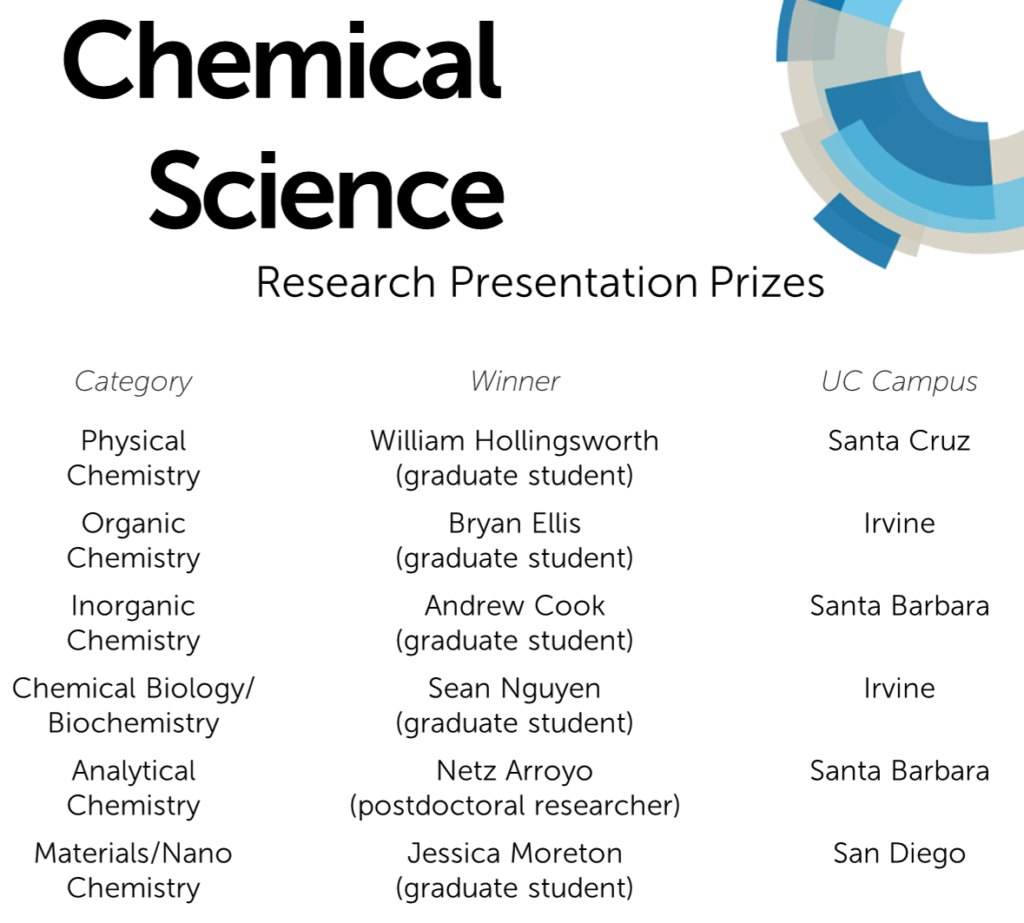
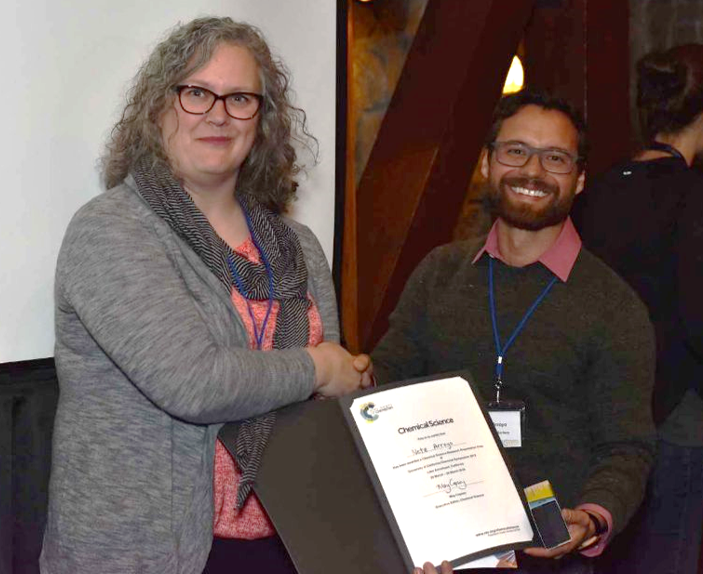
Netz Arroyo from UC Santa Barbara is presented a Chemical Science Research Presentation Prize by Professor Carrie Partch.
The Chemical Science Prizes were presented by keynote speaker, Prof. Carrie Partch from UC Santa Cruz and were also awarded for oral presentations in each of five other categories. Sean Nguyen from Jenn Prescher’s research group and Bryan Ellis in the Vanderwal Group took home prizes for UC Irvine. Sean’s talk on the development of orthogonal reactions for multicomponent labeling in biological systems earned him the Chemical Science Prize in Chemical Biology/Biochemistry and Bryan’s presentation on the development of an oxetane-based polyketide synthase substrate mimic won in the Organic category. In the Analytical category, the prize went to Netz Arroyo, a postdoctoral researcher in Prof. Kevin W Plaxco’s group at UC Santa Barbara. Netz presented his work on coupling electrochemical, aptamer-based sensors with closed-loop control algorithms. The goal is to achieve continuous real-time measurement of specific molecules in living things and ultimately feedback-controlled delivery of therapeutic drugs, which would be valuable in a clinical setting for any number of diseases. Also from UC Santa Barbara, Andrew Cook from the research group of Trevor Hayton was recognized in the Inorganic category for his talk on catalytically active nanoclusters. These acetylide-stabilized copper and thiolate-stabilized cobalt nanoclusters can also be immobilized on silica and would be valuable for nanostructured materials. Will Hollingsworth, who also served on the organizing committee for the 2018 UCCS from the Ayzner Group at UC Santa Cruz was awarded the prize for his talk in the Physical category on electronic energy transfer dynamics in conjugated polyelectrolytes, which would be especially useful for artificial photosynthesis when oppositely-charged donor-acceptor pairs are used. Will used a variety of time-resolved techniques as well as steady-state measurements to study these complex systems.

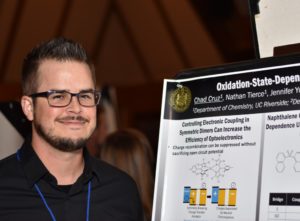
Chad Cruz from UC Riverside with his prize-winning poster on charge-separated S-bridged chromophores at the 2018 UCCS poster session.
The remaining posters were claimed by UC Riverside. The PCCP Poster Prize for best poster in the Physical Chemistry category went to Chad Cruz, a graduate student at UC Riverside jointly in the Chronister group and the Bardeen research lab. Chad presented on studies using anthracene in sulfur-bridged chromophore systems and examining the effects of changing the S oxidation state. His work shows significant insights into ways to tune excited-state properties in these bridged systems that could be used for optoelectronic devices due to their potential for forming long-lived charge-separated states.
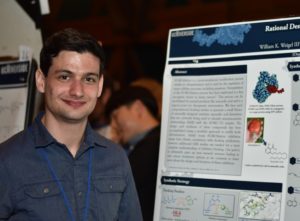
Bill Weigel from UC Riverside with his prize-winning organic poster on anacardic acid derivatives for enzyme-inhibition studies.
The Organic & Biomolecular Chemistry Poster Prize in the Organic Chemistry category went to Bill Weigel, a graduate student in the research group of Dave Martin at UC Riverside, which focuses on the design and synthesis of bioactive molecules; Bill presented his work on the use of computational docking studies to design anacardic acid derivatives, which he then synthesizes in order to study structure-activity relationships with enzymes. Specifically, they are examining the inhibition of the enzyme SUMO E1, which is known to be involved in oncogenesis, by these rationally-designed substrates.
The next UCCS will take place March 24-27th 2019 in Lake Arrowhead, California where we expect to see more exciting research and recognize the hard work of the graduate students and post-doctoral fellows behind it.










